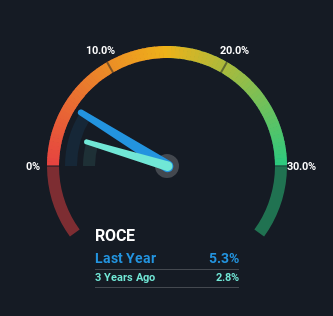- Italy
- /
- Telecom Services and Carriers
- /
- BIT:PLN
Slowing Rates Of Return At Planetel (BIT:PLN) Leave Little Room For Excitement
If we want to find a potential multi-bagger, often there are underlying trends that can provide clues. Ideally, a business will show two trends; firstly a growing return on capital employed (ROCE) and secondly, an increasing amount of capital employed. This shows us that it's a compounding machine, able to continually reinvest its earnings back into the business and generate higher returns. However, after briefly looking over the numbers, we don't think Planetel (BIT:PLN) has the makings of a multi-bagger going forward, but let's have a look at why that may be.
Understanding Return On Capital Employed (ROCE)
For those who don't know, ROCE is a measure of a company's yearly pre-tax profit (its return), relative to the capital employed in the business. To calculate this metric for Planetel, this is the formula:
Return on Capital Employed = Earnings Before Interest and Tax (EBIT) ÷ (Total Assets - Current Liabilities)
0.053 = €2.2m ÷ (€55m - €14m) (Based on the trailing twelve months to June 2023).
Therefore, Planetel has an ROCE of 5.3%. In absolute terms, that's a low return and it also under-performs the Telecom industry average of 9.1%.
Check out our latest analysis for Planetel

In the above chart we have measured Planetel's prior ROCE against its prior performance, but the future is arguably more important. If you'd like to see what analysts are forecasting going forward, you should check out our free report for Planetel.
So How Is Planetel's ROCE Trending?
There are better returns on capital out there than what we're seeing at Planetel. Over the past four years, ROCE has remained relatively flat at around 5.3% and the business has deployed 264% more capital into its operations. This poor ROCE doesn't inspire confidence right now, and with the increase in capital employed, it's evident that the business isn't deploying the funds into high return investments.
One more thing to note, even though ROCE has remained relatively flat over the last four years, the reduction in current liabilities to 25% of total assets, is good to see from a business owner's perspective. This can eliminate some of the risks inherent in the operations because the business has less outstanding obligations to their suppliers and or short-term creditors than they did previously.
Our Take On Planetel's ROCE
In conclusion, Planetel has been investing more capital into the business, but returns on that capital haven't increased. Although the market must be expecting these trends to improve because the stock has gained 52% over the last three years. However, unless these underlying trends turn more positive, we wouldn't get our hopes up too high.
If you want to continue researching Planetel, you might be interested to know about the 2 warning signs that our analysis has discovered.
While Planetel may not currently earn the highest returns, we've compiled a list of companies that currently earn more than 25% return on equity. Check out this free list here.
New: Manage All Your Stock Portfolios in One Place
We've created the ultimate portfolio companion for stock investors, and it's free.
• Connect an unlimited number of Portfolios and see your total in one currency
• Be alerted to new Warning Signs or Risks via email or mobile
• Track the Fair Value of your stocks
Have feedback on this article? Concerned about the content? Get in touch with us directly. Alternatively, email editorial-team (at) simplywallst.com.
This article by Simply Wall St is general in nature. We provide commentary based on historical data and analyst forecasts only using an unbiased methodology and our articles are not intended to be financial advice. It does not constitute a recommendation to buy or sell any stock, and does not take account of your objectives, or your financial situation. We aim to bring you long-term focused analysis driven by fundamental data. Note that our analysis may not factor in the latest price-sensitive company announcements or qualitative material. Simply Wall St has no position in any stocks mentioned.
About BIT:PLN
Planetel
Offers IP communication and broadband Internet solutions in Italy.
Reasonable growth potential with slight risk.
Market Insights
Weekly Picks


Crazy Undervalued 42 Baggers Silver Play (Active & Running Mine)


Fiducian: Compliance Clouds or Value Opportunity?

Willamette Valley Vineyards (WVVI): Not-So-Great Value
Recently Updated Narratives

Significantly undervalued gold explorer in Timmins, finally getting traction

Moderation and Stabilisation: HOLD: Fair Price based on a 4-year Cycle is $12.08


Positioned globally, partnered locally
Popular Narratives


MicroVision will explode future revenue by 380.37% with a vision towards success


NVDA: Expanding AI Demand Will Drive Major Data Center Investments Through 2026





